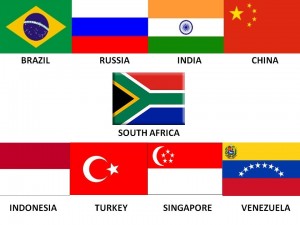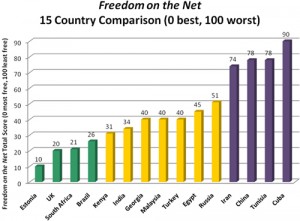Sustainable Policy-Based Data Management, Sharing, and Preservation
The third annual User Group Meeting for iRODS, the Integrated Rule-Oriented Data System, was held at RENCI, the Renaissance Computing Institute Europa Center at the University of North Carolina at Chapel Hill (UNC) February 17 – 18, 2011. Reflecting growing interest in iRODS, this year's meeting meeting was larger than last year's, with attendees from the US and Canada as well as Europe and Asia, and from large projects in multiple agencies as well as commercial partners. The meeting provided an opportunity for the growing iRODS community to participate in sessions on applications of iRODS, sustainability, and technology development planning, and more, all focused on helping users implement and extend the new paradigm of sustainable policy-based management, sharing, and preservation. For more information, including meeting products of presentation slides, papers, posters, Proceedings, etc. see the meeting website. The iRODS User Group Meetings are a good source of information and use cases on iRODS, see IRODS User Group Meetings.
From BRIC to BRICS–Sanya Declaration
01 Brazil, 02 China, 03 Economy, 03 India, 06 Russia, 07 Other Atrocities, 07 Venezuela, 08 Wild Cards, 09 Justice, 10 Security, 11 Society, Earth Intelligence, Government, IO Multinational, Reform, Strategy Full text of Sanya Declaration of the BRICS Leaders Meeting
Full text of Sanya Declaration of the BRICS Leaders Meeting
Xinhuanet.com English.news.cn 2011-04-14 21:58:57
SANYA, Hainan, April 14 (Xinhua) — Leaders of five BRICS countries, Brazil, Russia, India, China and South Africa, released on Thursday a joint document, Sanya Declaration, at the BRICS Leaders Meeting in south China's resort city of Sanya.
The following is the full text of the document.
Sanya Declaration
(BRICS Leaders Meeting, Sanya, Hainan, China, 14 April 2011)
Liberation Technology Snap-Shot
02 Diplomacy, Cultural Intelligence, Government, IO Multinational, IO Technologies, TechnologiesLiberation technology: dreams, politics, history
Armine Ishkanian, 5 April 2011
openDemocracy
The doctrinal commitment to new cyber and social technologies as a means of solving political problems needs to learn from the past and take a more realistic view, says Armine Ishkanian.
Read full article with many links.
From Google Group The Next Net:
I just finished a conference call on the minimal mandatory requirements for liberation technology for a specific area (there are at least another 50 that would need the same stuff–a generic capability–but in 50 other languages).
1. $169 cell phone to satellite communications converters, but structured to look like some other popular digital music device, along with a turnkey solar-powered Internet hotspot.
2. Open satellite channel over the area in question that can receive collect calls from anyone in the area of interest using an announced number and one of the devices.
3. Downloadable encryption for any cell phone on a use and delete basis from the satellite channel…like digital one time pads with no residue.
3. Satellite radio into the area of interest with real news relevant to that population including news of the diaspora and exile leadership.
4. Internet steganography.
I thought CIA, BBG, and JSOG were supposed to be able to do all that. Evidently not. I am being told that a fund-raising campaign is starting up to provide these capabilities to no fewer than three areas, possibly expanding to sixteen, all privately funded because the USG is not doing it.
– – – – – –

Here is a sample headline that sums up the current state of US Government attention to “liberation technology.”
Phi Beta Iota: Ms. McCall is a very accomplished Discovery Channel executive with remarkable achievements in one to many broadcasting. She has been in her current position since 27 July 2010 and does not appear to be headed for Assistant Secretary status anytime soon. The Undersecretary of Public Diplomacy and Public Affairs is Ms. Judith A. McHale, formerly President and CEO of Discovery Communications, parent of the Discovery Channel.
Reference: Open Source Agency (OSA) [Sister to BBG]
2009 DoD OSINT Leadership and Staff Briefings
2006 Briefing to the Coalition Coordination Center (CCC) Leadership at the U.S. Central Command (USCENTCOM)–Multinational Intelligence: Can CENTCOM Lead the Way? Reflections on OSINT & the Coalition
2004 The New Craft of Intelligence: How “State” Should Lead
2004: Information Peacekeeping A Nobel Objective
Creating a Healthy Society
Government, IO Multinational, Non-Governmental
Shaping the conditions to build a healthy society, a healthy nation consisting of healthy people who are motivated to look ahead..
To shape such conditions the international community should create a comprehensive approach.
It would be beneficial for the country, in this case South-Sudan (GoSS), if the UN / EU would deploy civil servants from crucial workplaces and from several levels of “our” own governmental management into South Sudan, to work as a coach for their fellow civil servants.
Reference: Internet Freedom–and Control
03 Economy, 04 Education, 07 Other Atrocities, 09 Justice, 11 Society, Autonomous Internet, Counter-Oppression/Counter-Dictatorship Practices, InfoOps (IO), IO Multinational, Methods & Process, Mobile
Freedom on the Net: A Global Assessment of Internet and Digital Media
Freedom House 30 March 2009
As internet and mobile phone use explodes worldwide, governments are adopting new and multiple means for controlling these technologies that go far beyond technical filtering. Freedom on the Net provides a comprehensive look at these emerging tactics, raising concern over trends such as the “outsourcing of censorship” to private companies, the use of surveillance and the manipulation of online conversations by undercover agents. The study covers both repressive countries such as China and Iran and democratic ones such as India and the United Kingdom, finding some degree of internet censorship and control in all 15 nations studied.
Phi Beta Iota: Although somewhat dated, the report is worth a look. If overlain with the countries where poverty makes Internet access or control moot, the global picture is clear: despots and poverty are coincident with the physical and digital impoverishment of the people. The emergence on multiple fronts of movement to create the Autonomous Internet using the Open Source Tri-Fecta is encouraging.
Worth a Look: Global Voices
Advanced Cyber/IO, Civil Society, Collective Intelligence, IO Multinational, IO Sense-Making, Worth A Look
Global Voices is a community of more than 300 bloggers and translators around the world who work together to bring you reports from blogs and citizen media everywhere, with emphasis on voices that are not ordinarily heard in international mainstream media.
About (Recommended–Works in 30 Languages)
Global Voices seeks to aggregate, curate, and amplify the global conversation online – shining light on places and people other media often ignore. We work to develop tools, institutions and relationships that will help all voices, everywhere, to be heard.
Tip of the Hat to Mario Profaca at Facebook.
Russia Returns Heavy-Hitter to Afghanistan
02 Diplomacy, 04 Inter-State Conflict, 05 Civil War, 06 Russia, 08 Wild Cards, Advanced Cyber/IO, Ethics, Government, InfoOps (IO), IO Multinational, IO Sense-Making, Peace Intelligence, Strategy
Highlights a classic failure of US intel and State…..no experts with the
depth or contacts necessary to conduct statecraft…….
Mullah Omar gets a Russian visitor
Asia Times, Mar 24, 2011
EXTRACT: The executive order makes the customary reference to the new appointee's worthy credentials as “an experienced diplomat and Orientalist”. And then, out of the blue, it adds that Kabulov “repeatedly held talks on the release of Russian pilots with the leadership of the Taliban in Kandahar, including [Taliban leader] Mohammed Omar”. There was no real need to have said that. It almost seems jarring to single out one mission in a distinguished diplomat's checkered career. But it said all that needed to be said.
By the language of the sport of cricket, one would shout from the crease in the heat of the moment: “Howzaat!” Is there an umpire nearby who could annotate the trajectory of Russian thinking? Not much ingenuity is needed to comprehend that Moscow is opening a line to the Taliban leadership and sending into the Hindu Kush someone who can meaningfully converse with the Quetta shura (council). Pakistanis know Kabulov, Iranians know him and Mullah Omar knows him. Afghan President Hamid Karzai knows him, too.
EXTRACT: Kabulov's mind is an open book – as far as a diplomat's mind can be. While serving in Kabul, he was an easily accessible ambassador and even American military commanders used to drop by to pick his brains. Kabulov's main complaint, though, was that the Americans were good listeners, but not good learners.
He kept harping on that the United States was repeating the same mistakes that the Soviet Union made in Afghanistan during its occupation in the 1980s, and to complicate matters, American policies have been innovating on Soviet mistakes by inventing original mistakes of their own for which as he once told John Burns of the New York Times, “We [Russia] do not own the copyright.”
Phi Beta Iota: The article is a reference work, worth keeping, worthy of war colleges and those who aspire to be great leaders.


